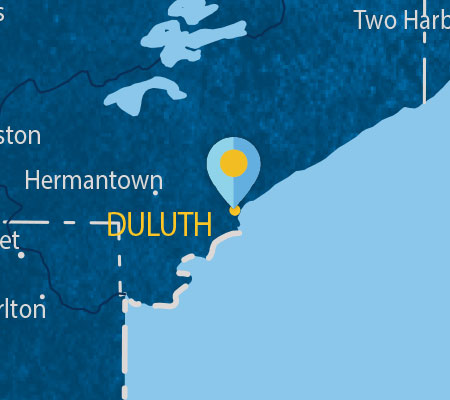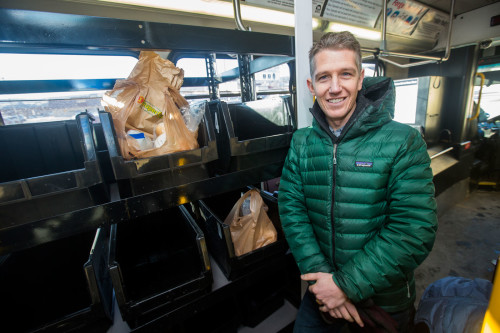
Zeitgeist and Fair Food Access Campaign Take Fresh Approach to Health Equity

Zeitgeist executive director Tony Cuneo stands in front of one of the retrofitted buses to demonstrate how groceries are safely transported to food deserts like the Lincoln Park neighborhood in Duluth.
But for a significant number of Minnesotans – 11.8 percent of the state population who live in poverty – gaining access to fresh fruit and vegetables is far more complicated. For instance, the Lincoln Park neighborhood in Duluth is the city’s lowest income and one of the most densely populated. It is classified by the USDA as a “food desert,” an area where nutritious and affordable food is hard to get, especially for those without access to a vehicle.
Blue Cross Blue Shield of Minnesota, through funding and support from the Center for Prevention, is partnering with the Zeitgeist Center for Arts and Community in Duluth to work towards positively impacting the way that residents can gain easier access to fresh food.
This work is just one of many ways that Blue Cross is strategically focusing on health equity, which addresses the socioeconomic factors that limit people’s access to health care and better health outcomes. Through this enterprise-wide focus, Blue Cross is taking actions to ensure that all people, regardless of race, economic, geographic or social condition, have equal opportunities to achieve their full health potential.
Duluth Organizations Unite For Fair Food Access
The Fair Food Access Campaign (FFAC) – started in 2012 by Zeitgeist and partners CHUM, Community Action Duluth, the Duluth Community Garden Program, and Duluth LISC – is attempting to tackle health inequity in Duluth’s Lincoln Park neighborhood.
“One of the things the Fair Food Access Campaign has learned from our Lincoln Park neighbors is that health disparities that exist in communities obviously are tied with access and opportunities for active living, but the strongest correlating factor is income,” said Tony Cuneo, executive director at Zeitgeist. “When we canvas the neighborhoods and talk to people about why they aren’t eating more healthy, fresh foods, the number one reported answer is it’s too expensive and I don’t have enough money – and we get it over and over again.”
“It’s about improving access to fresh and healthy foods for local Minnesotans, so it’s right in a neighborhood with a community center.”
Two years ago, one of the first steps of the Fair Food Access Campaign was working with Lincoln Park community leaders to plant and maintain community gardens. These gardens helped put food production directly in the hands of the residents in the neighborhood.
From Fair Food Access Comes Seeds of Success
The Fair Food Access Campaign also supports an urban farming program, Seeds of Success, which puts Lincoln Park residents with employment barriers to work growing food. Seeds of Success recruited other farmers and started operating the first ever weekly farmers market in Lincoln Park, which runs from June through October. The market makes it easy for residents to use SNAP benefits to pay for produce and other food at the market. Residents who use the SNAP-EBT (Supplemental Nutrition Assistance Program debit card, which used to be called “food stamps”) also are given a one-to-one per-dollar match from Blue Cross, up to $15 a week, allowing them to purchase more fresh and healthy options for their families.
“If the goal of starting the farmers market was about maximum visibility, we would’ve put it on a main drag somewhere, but it’s about improving access to fresh and healthy foods for local residents, so it’s right in a neighborhood with a community center,” Cuneo said. “We often have art classes going on for the kids so their parents can shop, and there’s a kitchen where you can do cooking demonstrations with the produce and ingredients from the market.”
Throughout the Farmers Market Season, Seeds of Success was able to host 16 market days, bringing in an average of eight vendors per day. More than 160 people used their SNAP-EBT benefits to purchase locally grown, healthy options right in their neighborhood.

The Grocery Express connects Lincoln Park residents to grocery stores across Duluth.
The Grocery Express
While shortage of income is the number one barrier to healthy eating in Lincoln Park, the second is lack of transportation.
Although the city bus system travels through the neighborhood, safety rules only allow one bag per passenger – and one bag of groceries is hardly enough to cover even two people for a week. Through a partnership with the FFAC and the Duluth Transportation Authority, a new bus route now runs one day a week from Lincoln Park and throughout the western half of the city, and stops at the front door of both a large grocery store and a new locally owned co-op.
“It’s called the Grocery Express. We retrofitted the bus and built a shelf and bin system so people can carry on as many bags of groceries as they want,” he explained.
Additionally, the group recently began to offer collapsible grocery carts for people who live farther from the bus stop but need to carry their groceries home. Cuneo said that the program would continue to evolve as they learn what works best for the residents while remaining financially viable to the Duluth Transportation Authority.
Food For The Future
The short-term tactics are helping, however, Cuneo says the FFAC coalition truly wishes to address long-term, policy-oriented solutions to the issues of health inequity and lack of nutritional options for low-income families.
“We often shape our goals and solutions to address something further upstream than just giving foods,” he said.
In doing so, the ambitious campaign often has many projects and plans in place at once. They work to add gardens and transportation, but they also wish to train residents to be entrepreneurs who can both grow and market food. For example,
Cuneo said the groups are working to fund a year-round “deep winter greenhouse,” which would scale up the revenue for the Seeds of Success program and unlock the possibility of a year-round farmers market.
Participants in the current Seeds to Success program have learned to create a new product called “Fruit Bits,” which is a professionally packaged, vacuum-sealed mélange of apples, carrots and kale. The product is sold commercially at a number of venues.
Blue Cross And The Community-Health Connection
Cuneo said Blue Cross simply understands and encourages collaborative community efforts like the Fair Food Access Campaign because they realize it takes a mix of organizations to tackle huge problems like food inequity.
“The relationship with the Center of Prevention has been outstanding in that they understand the connection between the social determinants of health and the need to address policy, systems and environment,” Cuneo said. “They’ve been ahead of the curve in wanting to address not just the symptoms but the root causes, and the health disparities that exist between different neighborhoods and zip codes.”
Follow along with Lincoln Park Fair Food Access on Facebook.
